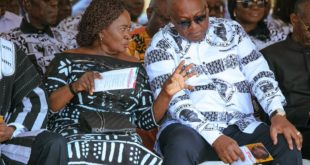S&P Global stated in a statement on Tuesday that default is now a “virtual certainty” and downgraded Ghana’s long-term local currency bonds to “selective default” in addition to lowering the country’s foreign currency debt to “CC” from “CCC+.”
The downgrading of the foreign currency bonds comes in response to the government’s recently announced efforts to restructure that debt, according to S&P, who described Ghana’s proposed local debt swap as a “distressed exchange offer” that gave those bonds the “selective default” rating.
On Tuesday, December 6, 2022, the projected 2023 budget was narrowly adopted by Ghana’s parliament, overruling opposition legislators’ objections to the debt exchange and a higher value-added tax.
The S&P downgrade comes after Moody’s Investors Service recently lowered its rating even further into junk territory due to the possibility that private creditors will suffer significant losses as a result of the government’s proposed debt restructuring.
According to a statement released on Tuesday, the nation’s credit rating was downgraded by two notches to Ca, the second-lowest rating at Moody’s.
Ghana is now on level with defaulting Sri Lanka as a result.
The rating follows government budget proposals for Ghana for 2023 that call for both domestic and foreign debt restructuring.
“The Ca rating reflects Moody’s expectation that private creditors will likely incur substantial losses in the restructuring of both local and foreign currencies debts planned by the government as part of its 2023 budget proposed to Parliament on 24 November 2022. Given Ghana’s high government debt burden and the debt structure, it is likely there will be substantial losses on both categories of debt in order for the government to meaningfully improve debt sustainability,” in the release, analysts Marie Diron and Lucie Villa wrote.
Outlook changed to stable
At the same time, Ghana’s outlook was changed to stable as the restructuring will likely happen in coordination with creditors and under a program with the International Monetary Fund, according to Moody’s.
“The stable outlook balances Moody’s assumption that the debt restructuring will happen in coordination with creditors and under the umbrella of a funding program with the IMF against the potential for a less orderly form of default that could result in higher losses for private-sector creditors.”
Last month, the West African nation established a committee to begin negotiations with domestic bondholders about restructuring its local currency debt.
According to statistics produced from a Bloomberg index, Ghana’s Eurobonds have been among the worst performers in developing markets since Bloomberg published the plans for the local debt recast in September, giving investors losses of roughly 12% during that time.
According to Abena Osei Asare, a deputy minister of finance, the country’s debt-exchange program would replace current conditions and swap loans with longer maturities at lower rates.
The initiatives follow a debt sustainability review that revealed a significant danger of financial disaster for the country.
The country was given a Fitch Ratings rating of CC, two notches above default.
Additionally, S&P Global Ratings rated it CCC+, which is seven categories below trash.
Since 2022’s first rating drop, Ghana has seen a string of them.
In his most recent budget speech, Finance Minister Ken Ofori-Atta attributed the downgrades to parliamentary differences over revenue mobilization tactics.
Source: Ghanatodayonline.com
 Ghanatodayonline.com News, Politics, Health, Education & More
Ghanatodayonline.com News, Politics, Health, Education & More



